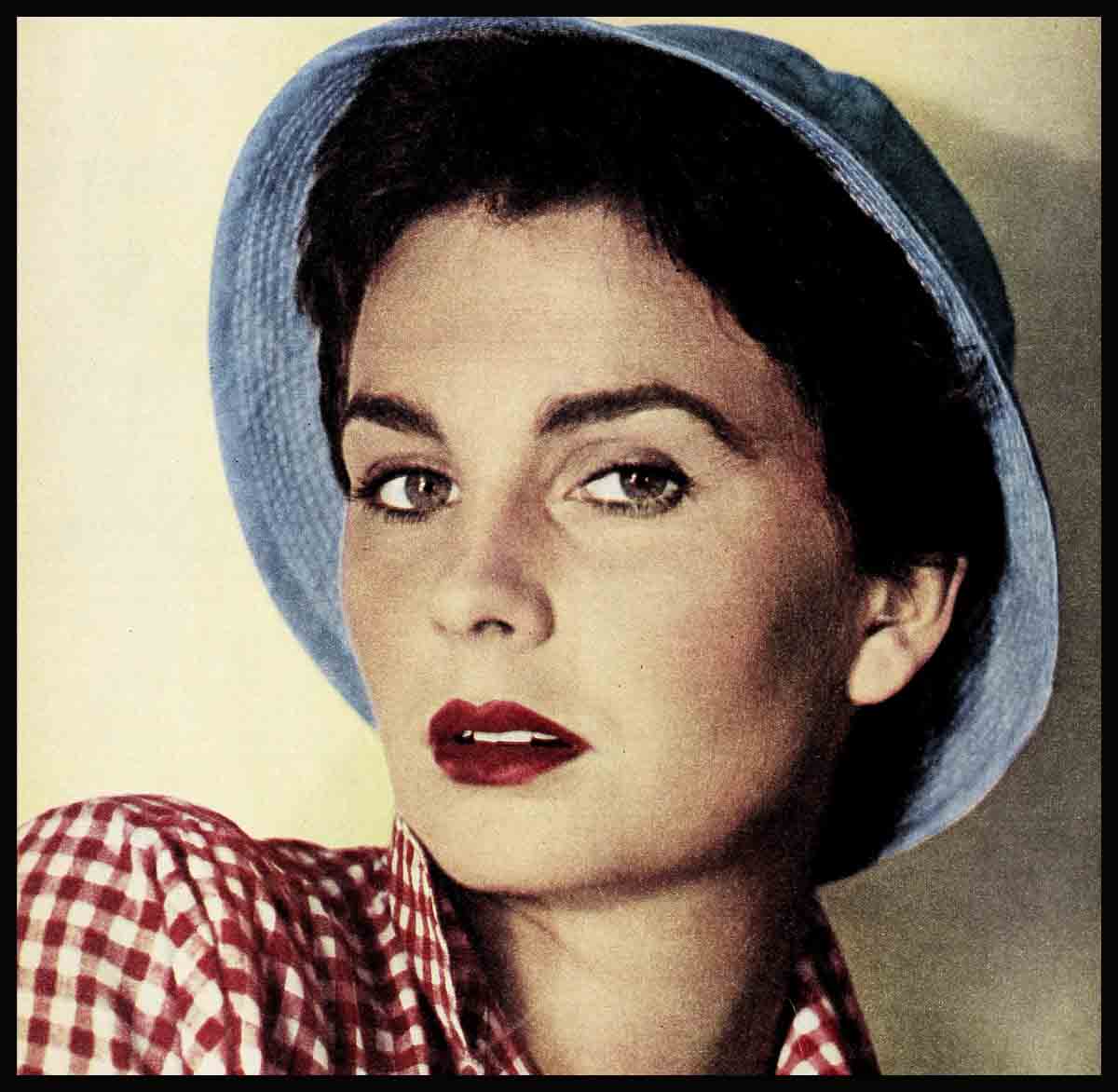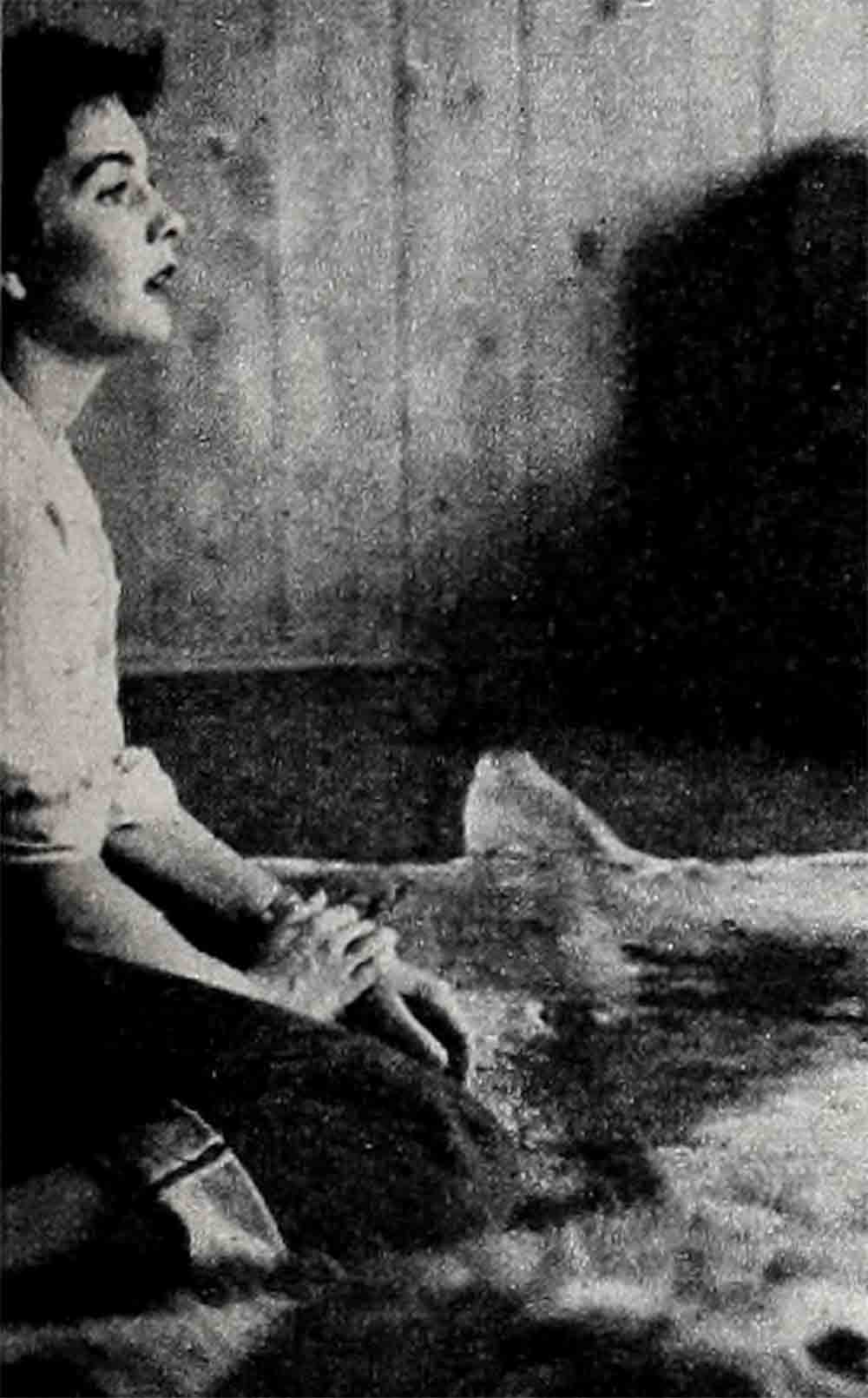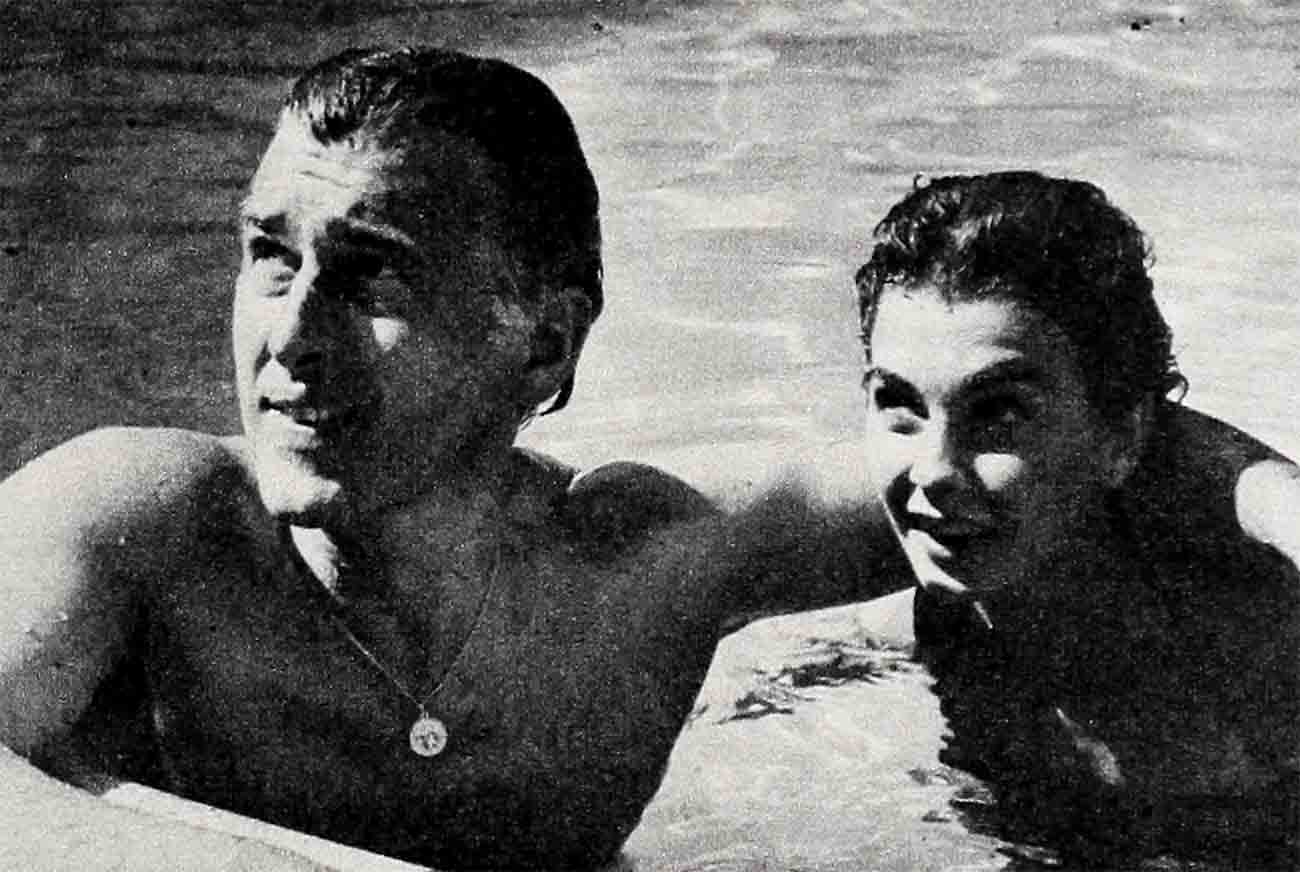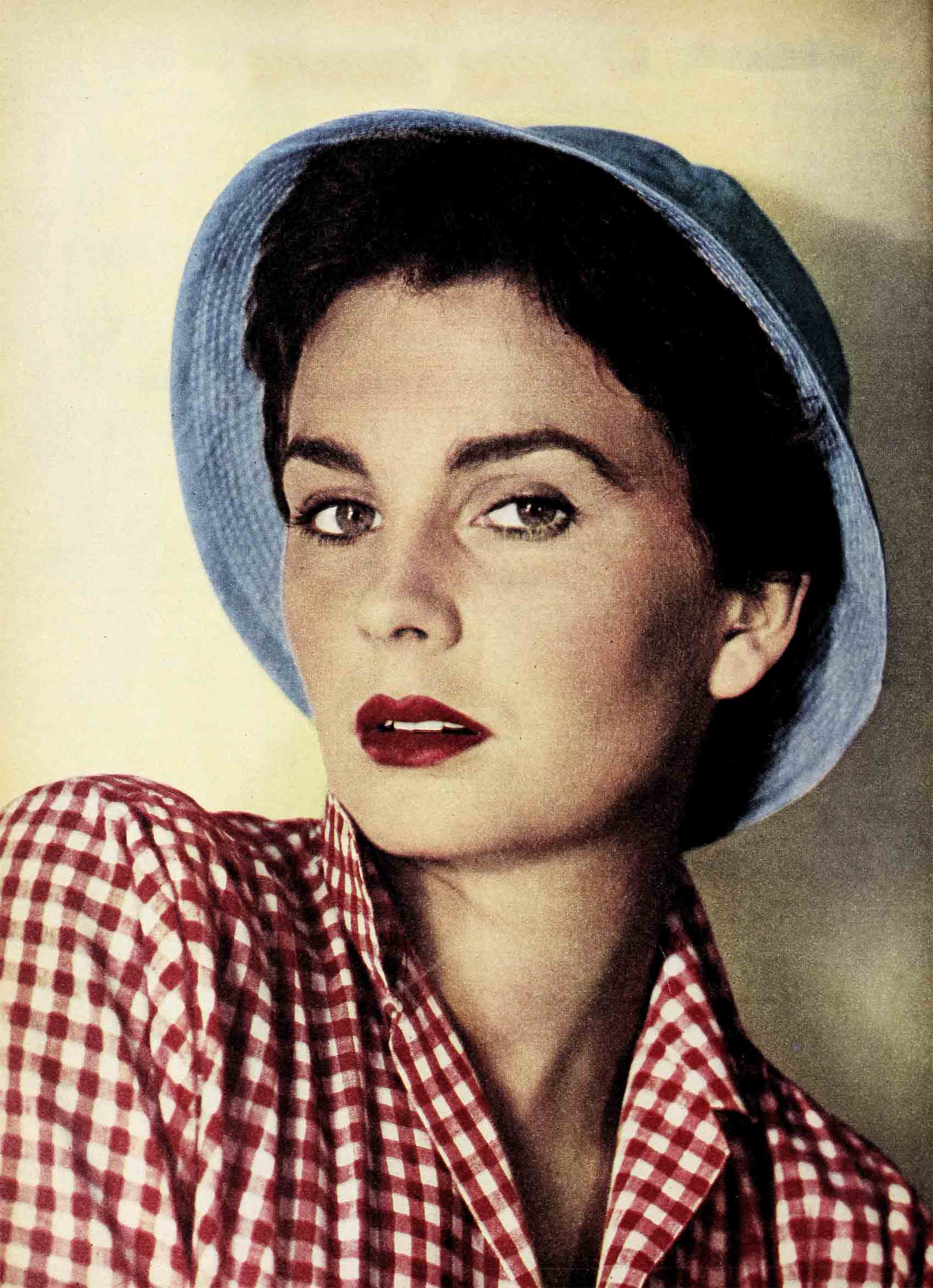
Sweet Stuff—Jean Simmons
The California Beet Growers’ Association not long ago awarded Jean Simmons a plaque naming her the sweetest actress of the year. The presentation, made on the set of “Desiree” without fanfare or advance notice, took Miss Simmons by surprise. She didn’t know what it was all about until she unrolled the accompanying scroll and started reading the citation: . . . to Jean Simmons, the sweetest actress of the year. . . “Oh, fudge!” she burst out. “That’s me?”
The remark shows that the slight and elfin-looking Miss Simmons is down to earth, has a sense of humor and doesn’t take herself too seriously. She’ll concede that she was pleased with the award, but she won’t lightly admit her qualifications for it. “Let’s not overdo that sweetness and light business,” she said. “I get to feeling kind of sticky just thinking about it. I’m really a—” and here she stopped, groping for the proper word—“I’m really a cat. Really, I am. I have my moods and I have a frightful temper. I’m quite a terror when I’m on the warpath.”
Studio people at the table smiled indulgently at Miss S.’s assertion of fierceness, while her stand-in, a pretty girl, cringed in mock panic. “That’s my trouble,” the terrible-tempered Jean complained. “Nobody takes me seriously. I always get the giggles and start to laugh just as I get good and going. I suppose it kills the effect. Still, believe me, I do have quite a temper.”
Despite Jean’s denials, she always gives an impression of great tranquillity. She’s lively and cute in her conversation, yet at the same time there is something very calm and unhurried about her in everything she does, whether it’s the way she walks, talks, eats, smokes or sips her coffee. In a field where it usually takes tremendous drive to get to the top, Jean Simmons seems oddly content to be passive and let things come to her instead of going after them.

Was that really true? I asked her. Did she lack ambition?
“No,” she said, after thinking it over. “It’s not true. I am ambitious about my work. Acting means a great deal to me. I want to be as good as I possibly can be.”
What about fame, fortune, public acclaim? Did that mean much to her?
“Certainly. It’s very nice to be a star. I like it.”
But did she have real drive and push? The urge to outstrip her competitors?
“No, I’m afraid not,” she admitted. “I feel a little guilty at times when I hear of other young actors and actresses struggling and starving for years before they get their first break. I was very lucky—I never had to go through any of that. Everything always seemed to sort of fall into my lap. Otherwise I’d probably be a dancing teacher somewhere in London today. That’s what I really started out to be.”
Jean and her sister Edna had both enrolled in Miss Aida Foster’s School of Dancing in London towards the end of the war, dreaming of getting their teacher’s licenses and opening up a studio themselves. Jean was only fourteen at the time but seemed to know what she wanted. She’d been at the school only two weeks, though, when she was noticed by a movie talent scout, asked to audition for producer Val Guest and picked from over two hundred candidates for a juvenile role with Margaret Lockwood.
“I was delighted, of course,” Jean says, recalling this early triumph. “I’d never dreamed of getting into the movies. I had a granddad, you know, who’d been a music-hall performer, but he nixed that for his own family. He didn’t want any of his kids to be on the stage. My folks were very understanding, though. And frankly, we could use the money. There wasn’t too much of it around in those days.”
Looking at Jean it seems obvious that she must have had a wonderfully happy childhood even without money. Born Jean Merrilyn Simmons, the youngest of four children, she grew up in Golders Green, a not-so-fashionable London suburb, where her father—a former swimming champion—was a school teacher. “We had a very warm and affectionate family life,” she relates. “To this day we’re all very fond of each other. I don’t remember ever hearing an unkind word in our home. Being the baby, I probably was dreadfully spoiled; anyway, I certainly got my share of love and affection. I simply adored my daddy. It’s my one great sorrow that he didn’t live to see me become a success. He would have been so proud.”

During the war Jean was separated from her family, though, when she was evacuated to the country along with other London children and spent a couple of years in Somerset. She won her first movie part shortly after her return to London, tagged along for a while in a succession of minor roles—actually earning her dancing teacher’s license in-between movie work—and didn’t get a major break till she reached the advanced age of sixteen when she was selected for the role of the young Estella in “Great Expectations.” Her portrayal of the capricious, charming child brought her international critical praise and started her securely on the road to fame. The memorable performance she gave as Ophelia in Laurence Olivier’s production of “Hamlet” cemented her reputation, winning her four international film awards. It established Jean as a star of the first magnitude and made her England’s most beloved young actress.
“It took me a while to acquire a taste for Shakespeare,” Jean concedes. “I might never have except for people like Gabriel Pascal and Larry Olivier going to a good deal of trouble trying to make me see the light. It takes a little effort, but I now find Shakespeare fascinating once I grasp the full meaning of his words. I’d like to do Juliet someday. And perhaps Rosalind, in “As You Like It.”
She finds herself a little bemused, though, with her friends the Oliviers’ new project for the London stage, Shakespeare’s “Titus Adronicus.” “Spence—Spencer Tracy—gave us a graphic run-down of the play the other night. It has the most gruesome, gory plot . . .” She shuddered a little, imagining the mutilations around which the story revolves. “I suppose if Larry and Vivien are going to do it, the play must have its merits,” she then added philosophically.
After “Hamlet,” it was inevitable that Jean would eventually go on to stardom in Hollywood. Her beauty was obvious, her talent confirmed by a series of successes. But before she transferred her activities to this side of the ocean, there were several more years of film making and fun in London. Still in her teens, an established star adored by the British public, Jean had herself one whale of a time. “There was always so much to do, so much excitement,” she recalls a little nostalgically. “I never had a chance to get bored. I love California—I wouldn’t live anywhere else in the world—but I do get homesick for London.”
During her “British” period, Jean also made one picture, “The Blue Lagoon,” in the Fiji Islands. This gave her a chance for a trip around the world and her first acquaintance with the United States. However, Hollywood had its first glimpse of Jean when, on her return trip, she served as proxy for several British artists at the motion picture Academy Award presentations. Not knowing what was in store for her fellow Britishers, she’d prepared one short speech of acceptance. She had to ad lib when she was called back six times instead of once. Her charm and poise were so great on that occasion that she scored a personal success with her impromptu performances.

Nineteen-fifty—the year she turned twenty-one—was a momentous one for Jean Simmons. She married Stewart Granger, with whom she’d been in love since she was a child (even before she ever met him in person). And in that same year, Jean found herself committed to RKO in Hollywood when Howard Hughes bought up her contract with J. Arthur Rank. Her subsequent feud has been widely publicized.
Stewart Granger—“Jimmy” to his wife and his friends—had been Jean’s movie idol long before she dreamed of meeting him in person. When she did—on the set of “Mr. Emmanuel” where he visited Elspeth March, to whom he was then married and whose daughter the fifteen-year-old Jean was playing—she fell head over heels in love with him. It wasn’t until several years later, though, after he was separated from his wife and Jean and Jimmy co-starred in a film “Adam and Evalyn,” that he in turn paid any attention to her. They were married in Tucson, Arizona, a couple of years later.
There have been rumors at times that all wasn’t well between the Grangers. It’s been said that Granger is pushing Jean into the background, that he’s domineering, overcritical and belittling. On account of professional commitments they’ve had long periods of separation, a hazard to which the average marriage isn’t exposed, and one liable to blight the happiness of the most congenial couple. Much has also been made of the fact that Granger is quite a bit older than his wife.
Jean, on the other hand, is known to enjoy flirting a little. She’s been seen out with male friends when her husband was away, but that has always been entirely in the open and with Granger’s knowledge and consent.
Jean doesn’t look like the kind of girl whose ego takes a constant beating at home; she also struck me as sufficiently mature to be attracted to a man somewhat older than herself. Jean certainly doesn’t appear to be torn by marital or any other kind of conflict. Jean frequently mentions her husband affectionately and she doesn’t exactly seem to be looking forward to their frequent separations. “Maybe I’ll be able to go to India while Jimmy works in “Bhowani Junction,” she says wistfully. She’s been asked to play on Broadway, but she says she couldn’t see it. “Jimmy and I couldn’t do one together under the terms of his contract, and I wouldn’t want to commit myself alone for any length of time.”

Jean thinks a good deal of her husband’s artistic judgment. She refers to him and quotes him frequently in conversation and gives him enormous credit for coaching and helping her with her own parts. Further, she cheerfully admits his taste prevails in furnishing their home and that he is in complete charge of the kitchen. “He won’t even let me come near it,” she said. “ “You stick to your acting,’ he tells me.”
Falling under the spell of Miss Simmons is easily done and men and women have been known to resent and avenge the least slight, but who can help feeling that Jean’s husband is perhaps right in maintaining acting—not food—is her forte. For lunch she’s likely to order something that might better be referred to on the menu as the “Truckdrivers’ Special,” a corned beef hash with browned potatoes kind of affair that looks at its best like army chow at its worst. She seems to enjoy it thoroughly and is willing to try even the most teasing food suggestions of her friends—like pouring syrup over her hash.
Perhaps it’s that kind of suggestability that makes her appear cowed and docile in the presence of her husband. However, if she’s actually sat upon, she has at least preserved her sense of humor. One marital dispute of long standing has been about the choice of television programs. Granger likes prize fights, Jean doesn’t. Spencer Tracy, who is one of their close friends, once advised her to assert herself. “You pick your program for a change, Jean,” he told her. “No reason in the world why Jimmy and I should always have our way.”
“At that my husband pipes up and says something about a fight being on between some Kid Cocoa and a Hurricane Jackson, or some such names,” she relates. “ ‘Like I said,’ Spence continued. ‘You pick your program for a change—tomorrow night.’ ”
“We eventually settled the argument by getting a second television set. Now Jimmy looks at one and Rushton, our butler, at the other.”
There is a decidedly mischievous streak in the gentle Jean, but her wit or her pranks are never unkind. When she made “She Couldn’t Say No” with Robert Mitchum back in ’51, one of the scenes called for her to stand in fishing boots in a rushing stream and to be picked up and carried away by Mitchum. Rugged Bob nearly broke his back trying to lift her up and sling her over his shoulder. Jean had gained unsuspected poundage when she filled her boots with lead.
Another time she quietly watched the director instruct an electrician by the name of Pettibone how to adjust the lighting for a shot. Pettibone was of particularly short stature.
“Higher,” the director shouted.
Pettibone dutifully lifted the light higher.
“Higher still,” requested the director.
Pettibone complied.
That continued several times until Jean burst out: “If we aren’t careful we’ll run out of Pettibone.”
And once, when Sherman Billingsley of the New York Stork Club inadvertently introduced her to the audience as “Miss Sigh-mons,” she turned to him smiling radiantly. “Thank you very much, Mr. Billingsgate,” she said.
The people who work with her every day are full of praise for Jean’s simplicity and lack of star-consciousness. There is a feeling of complete equality between Jean and her stand-in with whom she frequently lunches. Vivian, her hairdresser, is a longtime friend; and back in London she used to share a flat with the girl who took care of her wardrobe. She’s known to treat studio grips with the same courtesy as she will the head of the studio, the director or a fellow star. She’s extremely affectionate and has none of the traditional British reserve about showing it. Once her husband’s stand-in ambled over to the set of “The Egyptian.” She’d always liked him, hadn’t seen him for some time and gave him a big hello, kissing him on the cheek.
“I wish you’d do that for me,” one of her co-stars said.
“I will,” Jean replied. “When I know you as well as I know Bob.”
She’s invariably kind, generous and ready to help those who need it. She does those things quietly, though, and won’t talk about them as she doesn’t want to embarrass anybody. From others, however, I’ve heard of doctors’ bills that were paid and of children who were sent to camp.
Their home, incidentally, has rarely been photographed. With so much of their private lives exposed to the glare of publicity, this is one part they try to guard jealously. They don’t go in much for nightclubbing or other fancy amusements, but spend most of their leisure hours at home or at friends’. The Wildings, Mike and Liz, are their most intimate friends, and the two couples spend much time alone with each other, but on Sundays Jean and Jimmy usually entertain a fair-sized crowd of friends.
By her own admission, Jean is lazy when she’s not working on a picture. Dressed in jeans and a T-shirt, she loafs around the house reading and listening to music. She loves to sleep. When I asked her what she was going to do when she finished her picture, she put the palms of her hands together, leaned her cheek against them and blissfully closed her eyes. “Sleep,” she said. “Sometimes I go to bed at nine and sleep through till ten the next day.” She also swims, plays tennis and is wild about dancing. Experts claim she could have become a prima ballerina if she hadn’t been side-tracked into the movies. Her ballet training shows itself in the way she moves and walks. Her stance, posture and grace- fulness are a not inconsiderable part of her charm.
Jean has a sexy figure and looks stunning in evening clothes, but her alleged indifference to clothes appears to be genuine. Last spring she received a frantic call from a certain dress shop. It was the afternoon before the PHOTOPLAY Awards ceremony, and the store had just discovered that the identical dress as the one Jean had ordered for the occasion had been sold to Lana Turner as well. Instead of getting excited, Jean merely told the store to pick out another dress and send it up. Later everybody commented on her exquisite taste and how beautiful she’d looked in that particular dress.
Gossip has it that after four years in the United States Jean has become sufficiently Americanized to be a baseball fan. She seems to enjoy it all right, but there’s evidence that she has yet to grasp some of the game’s finer points. Once she attended a ball game with her husband and became wildly excited cheering on the Boston Bobby-soxers.
Told that the team was called the “Red Sox,” she became quite flustered. “Oh dear,” she said. “It’s a good thing nobody heard me. They would have thrown me out right on my pretty, little—ear.”
Jean blushed a little, admitting that she used words occasionally that might not be entirely acceptable at St. James’s Court. “I suppose I shouldn’t,” she says. “I don’t like it in other women. I must have caught the habit from Jimmy. He’s real bad.”
There is a school-girlish quality about Jean at times that is particularly endearing considering she’s been a star since her teens. After years of success and acclaim she still doesn’t take her position for granted. When someone pointed out Lillian Gish coming into the commissary, Jean craned her neck trying to get a glimpse of her. She’d never met her and was excited seeing her in person for the first time. Her reaction then lent credence to a story that has been told around Hollywood for years.
Jean was already an established star on her second visit to Hollywood when producer Hal Wallis gave a large party in her honor. Jean showed up with an autograph book, thrilled over the opportunity to add to her collection. “Sure, it’s true,” she says emphatically. “Just imagine what a thrill it was for me to meet all those famous people. I’d heard about and admired for so long.”
There is, however, nothing girlish or naive about Jean Simmons when she’s talking about her art. She’s exceedingly well informed about every phase of motion-picture making and will talk with authority about any angle one may wish to approach—photography, direction, scripts or acting. She responds with intense interest to whatever is said, whether the talk is about the great French director Duvivier, Marlon Brando or something as specialized as camera technique. For Jean Simmons—lest one forget it over the charm of her personality—is a professional first and last, an artist to her fingertips.
There is an old wheezer in show business that hunger—being good for the soul—is part of the making of a good actor or actress. Jean Simmons, a great actress, is proof that this isn’t necessarily true. She’s been fortune’s darling—blessed with luck, beauty, talent and charm. Unwarped by driving ambition or struggles, she’s been able to preserve the one quality which in addition to all others makes her unique—genuine kindliness. The beet growers, it would seem, weren’t wide of the mark: she’s the sweetest.
THE END
It is a quote. PHOTOPLAY MAGAZINE JANUARY 1955




